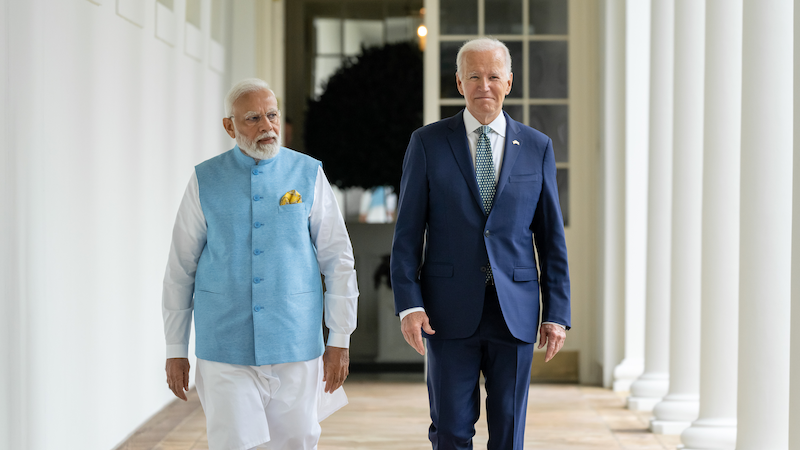
By Rahul Jaybhay
June 15, 2024 marks the fourth year since China’s deadly escalation at the Galwan Valley. Since they began in 2020, negotiations and dialogue are yet to deliver any resolution to the border dispute. As such, India’s multi-alignment strategy, precisely implemented to ‘manage’ China, has run its course and requires recalibration.
The multi-alignment strategy is conceptually synonymous with the non-alignment approach that India followed post-independence. Indiaavoidedalliance entanglements, renounced bloc politics andraised collective consciousnessin post-colonial independent nations.
In the same vein, the multi-alignment strategystipulates maintaining tieswith all the great powers without commitment to any of them,straddlingmultipleglobalinstitutionsand pushing the voices of the Global South foreward.
Both non-alignment and multi-alignment embrace employing India’s defence capabilities to push back against powers that encroach on India’s sovereignty. But both approaches also shy away from prescribing security coalitions or alliances to manage India’s security relations with a more powerful revisionist actor — China.
But India’s history suggests that Indian leaders were not always averse to security coalitions or alliances. In 1939, before India’s independence, Asaf Ali, the honorary secretary of the Congress Party and a member of the Congress Legislative Assembly,drafted a memotitled ‘India’s Defense Problem’. Raising the prospects of sea-based invasion, Asaf Ali floated the idea of ‘concluding treaties’ with countries that can ‘guarantee the neutrality and safety of Indian waters’. In the concluding section, Ali suggested India partake in ‘mutually advantageous engagements’ to preserve its security in case of external aggression.
Asaf Ali’s recommendationresonated withSarat Chandra Bose, another Congress Legislative Assembly member who likewise suggested that, were India to decide on ‘equality in cooperation in defence’ with the United Kingdom, it would offer New Delhi ‘very great strategic advantages’.
For Indian leaders, these defence arrangements not only served security interests, but also formed a mechanism to coordinate defence and security policy with other states. During the crisis with Pakistan in 1950, India’s first prime minister Jawaharlal Nehruexpressed his interestin forming ‘a common economic and defence policy’ for India and Pakistan for the greater defence of the Indian subcontinent.
Ina speech delivered in Karachi on 9 January 1946, Nehru, complimenting Indian diplomat KM Panikkar’s assessment of the significance of the Indian Ocean Region,suggested coalition-building in South Asiafor ‘mutual protection as well as mutual trade’.
India signed a treaty with Soviet Union in 1971,demonstratingits willingnessto enter into ‘mutual consultations’ for addressing threats. This occurred against the backdrop of India’s intervention in Bangladesh and Pakistan’s pleas to Washington to undercut New Delhi’s dominance.
The idea of forming defence arrangements — either bilateral alliances or coalitions — was floated as a way to enhance security, coordinate policies with other states and expand India’s centrality and regional posture for defence in South Asia.
For Nehru’s India, thedeep-seateddistrustfor alliances or coalitions emerged from the colonial past, which hollowed out India’s foreign policy independence. In Nehru’s thinking, alliances were responsible for world wars — so, India rejected bloc politics. Alliance obligations also trap nascent post-colonial countries in security commitments, foreclosing their development options.
Under Prime Minister Narendra Modi, alliances or coalitions mean shunning the possibility formultiple ties and engagements. They alsoprecludemaximising options— bilateral or multilateral engagements — discounting India’s prospects of exploiting global rifts and ruptures. Security coalitions are also seen asprovocativetoChina, potentially dragging both countries into long-drawn conflicts.
Thepossibility of alliance membersnot reciprocating their security obligations also rattles New Delhi. Such arrangements could curtail India’s great power aspirations by binding New Delhi into an intractable conflict with Beijing.
But India’s balance of power with China is too tenuous to face China alone if they lock horns. Indiamustrely oneither a much deeper bilateral security partnership with Washington or initiate a security minilateral with Himalayan states alongside the United States to resist threatening actions from Beijing on its borders. India’s Doklam intervention with Bhutan against China’s incursions indicates such a possibility.
The official view is that security coalitions can be provocative. But they can also act as a deterrent to China’s actions. Multiple minilaterals areemerging intheIndo-Pacific— AUKUS, Philippines–US–Japan cooperation and SQUAD — topushback against Beijing. As these states solidify deterrence in their regions, Beijing’s aggression may be re-directed towards disputed Himalayan borders, where New Delhi is reluctant to reset the power equilibrium that favours Beijing.
New Delhi’s best bet lies in either deepening military ties with Washington or forming a minilateral, either with regional actors or extra-regional partners.
The former wouldenableIndia to counter China, fuelling India’s military and economic heft. It is the best chance for India toemerge as asignificantpowerby relying on Washington to realise its dual purpose — to deter China and ensure its own rise.
The latter offsets New Delhi’s fear of getting entrapped in conflicts or skirmishes that come with alliance obligations. A minilateral approachworks to shapegeopolitical competitionin specific geographical areas and asking for more commitments beyond an issue area is untenable. New Delhi could use such measures to deter Beijing without the obligation to militarily reciprocate beyond its contentious Himalayan borders.